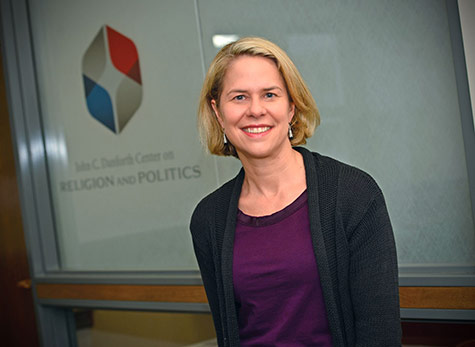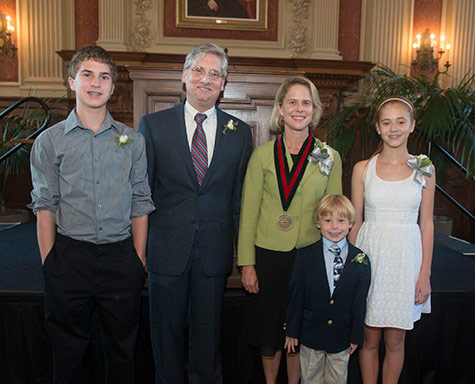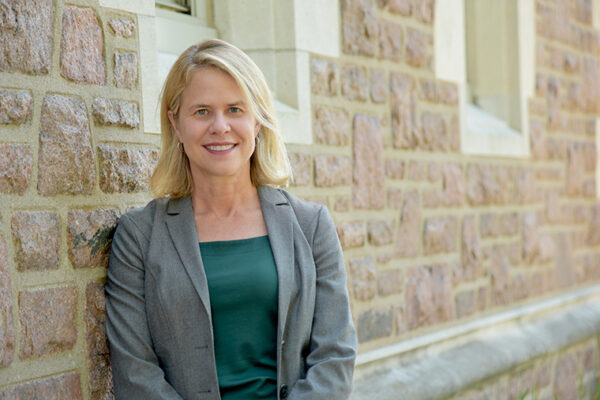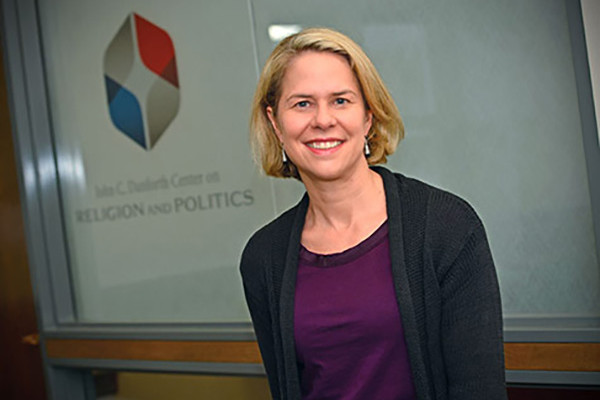Marie Griffith, PhD, is the director of the John C. Danforth Center on Religion & Politics at Washington University in St. Louis. Griffith, the John C. Danforth Distinguished Professor in the Humanities, came to WUSTL in 2011 from Harvard Divinity School. Her husband, Leigh E. Schmidt, PhD, the Edward Mallinckrodt Distinguished University Professor, is also a faculty member at the Danforth Center.
Griffith’s areas of expertise include evangelical Protestantism and gender in 20th-century America, and her next book will be an analysis of sexuality debates titled “Christians, Sex and Politics: An American History,” due out in 2015.

How did you become interested in religion and politics?
I grew up in the South, where religion was always intertwined with politics, and I had a very strong interest in both subjects even as an adolescent. This was during the 1980s, when politics and religion both were changing so rapidly, and it was the era of the rise of the Religious Right. Growing up in the Bible Belt amidst all that was very interesting.
When did you realize you could make a career out of this interest?
I knew as an undergraduate at the University of Virginia. I probably knew first that I wanted to be a professor before I knew which specialty to pursue. I really loved the teaching dimension of academia, and I was always drawn to the classroom and to working with students. I looked at my professors and thought that they led the greatest lives. They got to read books, write and work with students for an actual salary! It just looked like a really meaningful life, and it is.
I focused my undergraduate studies on political and social thought, and then in my third or fourth year, I started studying religion. I knew I wanted to study religion especially, but I always had a strong interest in the political dimension, whether relating to gender, race or other issues that have been politicized in the U.S. for many decades. My work always has focused a lot on women and gender issues, and I had very strong professors, both male and female, as mentors who sparked and nurtured that interest.
How has your research evolved?
In graduate school, where I was trained by historians in both historical and qualitative methods, I focused my research locally. In my dissertation, I interviewed evangelical women in a specific organization that I also traced out historically as part of the broader American Protestant tradition. Over time, I would say my research has expanded outward to ask broader questions about the consequences of religious belief. So, rather than just looking closely at particular communities, my work now tends to ask broader political questions about the impact of religion on U.S. history and society.
What are you working on now?
I’m writing a book about the debates over sexuality in the American churches, starting in the early 20th century. My question is, ‘Why has sexuality been so divisive in American religion and American politics for so many decades? Why have the stakes been so high, and the conflicts so pervasive, around such issues as homosexuality, female chastity and marriage?’ My book attempts to answer that question.
What drew you to the Danforth Center for Religion & Politics two and a half years ago?
I was very drawn to the idea of the center, both as an academic research center and one that would really pull together and support the very best research on religion and U.S. politics in the country. However, I also wanted to speak to current issues and concerns. I feel very good about the steps we’ve taken in both directions. These are long-term goals; they’re not quickly achieved. But I feel like we’ve done a really great job so far, and we’ve built a community that is quite committed to working for these goals into the future.
Is the center unique in academia?
In many ways, it is. There are, of course, other centers at other universities that study politics, and there are a number of academic centers devoted to the study of religion in America or religion more globally, but there really are no such centers that are truly focused on both, on the nexus of religion and politics in the United States, over time and in the present. More importantly, perhaps, there are really no others with both the academic and public focus that our center has. So, yes, while there are many other centers with which we share some things in common, I would still say that ours is a genuinely unique venture in higher education right now.
What are you most proud of in your tenure as director?
I’m really proud of the great faculty that we have brought here and will continue to hire, all of whom bring tremendous intellectual heft and expertise to our community. I’m just as delighted with our postdoctoral fellows and graduate students we are hosting from other institutions to pursue their research and teaching for a short time at Washington University before going elsewhere. We’re working hard to support the research of scholars both here and across the country who are working on various dimensions of religion and politics in the U.S. I feel great about recruiting top-quality scholars from around the country.
I think we’ve also managed to cultivate a public voice through venues such as our online journal, Religion & Politics. It’s gotten a lot of attention from people both within and also outside of academia, including journalism and politics.
What’s going on at the center now?
We had our first Danforth Distinguished Lecture Series in the fall, and we received wide press coverage for that, and praise for the event itself. All of our events are public (and free), and a lot of people from St. Louis come out and participate in our offerings. We also videotape everything and try to push our events out to the public through social media and the usual venues. We had great success with that lecture series and with other things we’re doing. In March, we’re bringing in eminent scholars from around the country for a large conference titled “Beyond the Culture Wars.”
I think we’re doing a really good job of trying to educate the broader public, not only about what’s going on today, but the history of these issues as well. We can’t really understand the contemporary context without understanding how we got here. Our faculty have strong historical expertise, and there’s a reason for that. We all feel like the historical focus is vitally important to this venture.
Where do you see the center in five years?
Even as we continue to cultivate great scholar/teachers and educate students to understand our broader religious and political culture, I’d like to see us develop new partnerships: with organizations based in Washington, D.C., for instance, as well as other university centers and organizations around the country that are doing work that might be complementary to our own. I think we can go only go so far on our own, so I look forward to creating new collaborations.
I’m also very interested in perhaps having more global reach eventually. The center began with a U.S. focus and will always have particular expertise there, but we’re well aware that the U.S. is a global nation and that we live in a globalized world. We need to think more about issues such as religion’s role in U.S. foreign policy and our relations with other nations, just to name some obvious ones. One of our other faculty members and I will be traveling to China in April to meet with some faculty at Fudan University, and we would like to see if there are partnerships there or elsewhere.
In general, then, I’d certainly like to see us increase our public influence and our geographic focus even as we continue to support excellent research here in St. Louis. We would like to set new agendas for the study of religion and politics as a field, while training students who may go on to serve in important leadership roles in a wide range of professions.

Your husband is a prominent member of the Danforth Center as well. Do you both tend to bring your work home with you?
We try not to. We have three kids, so home life tends to be taken up much more by discussions relating to mundane things like carpooling or cajoling them to do chores. Our kids range in age from 6 to 16, so it’s a bit of a zoo at times. I try to avoid shop talk at home, but that’s impossible when you work together. [Laughs]
What do you all like to do together as a family?
We’re very outdoorsy. We spend a lot of time hiking and kayaking, and doing other outdoorsy activities when we can. We spend our summers in Maine. My husband and I can both work from there, and the kids have grown up spending summers at a home we have there. They are pretty much outdoors every day, as much as they can be.
Do your children show signs of following in your footsteps?
No. In fact, our oldest said some years ago, “No offense, Mom, but I think religion is kind of boring.” And I laughed and said, “Oh well, that’s OK.” But I think now the older ones are seeing how interesting this all is. They’ve learned about Islam, Christianity and Judaism in school. Social studies courses now include a really good amount about understanding religion as a part of culture. I think they have some interest in it, but I’d be pretty surprised if they follow in our footsteps. [Laughs]

